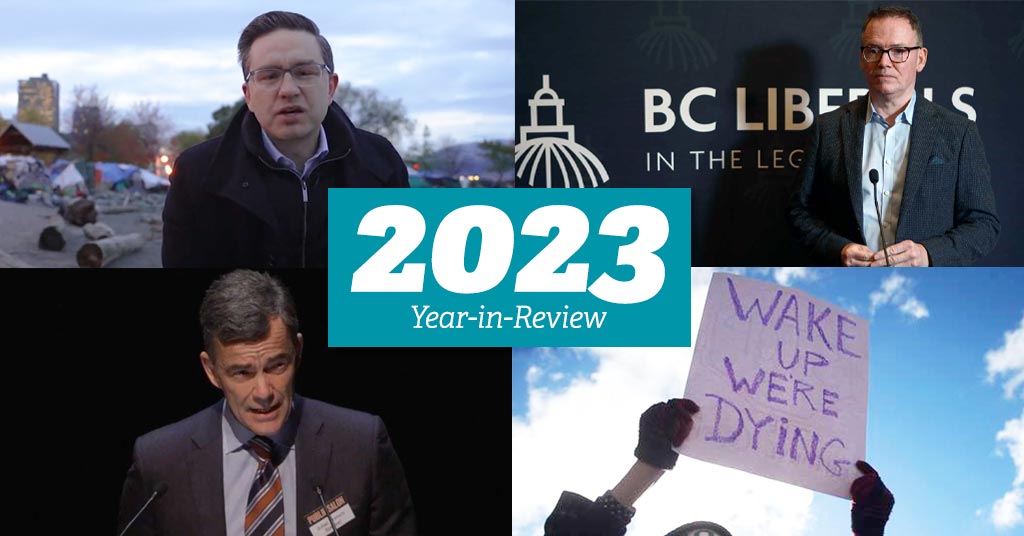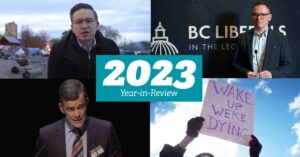
The Politicization of BC’s Overdose Crisis was a Top Issue in 2023
How right-wing politicians and media outlets exploited a crisis impacting the health of vulnerable drug users for their own political gain
Attacking safe supply and politicizing the health and safety of vulnerable people was a popular talking point among right-wing politicians in 2023.
Pierre Poilievre set the stage at the end of last year when he released a video mischaracterizing and politicizing safe supply, a talking point that was further advanced by other politicians and media personalities.
At the beginning of 2023, BC took a progressive step in drug policy by becoming the first province in Canada to launch a drug decriminalization pilot.
But what was initially seen as a positive step, was eventually exploited by the right who stoked a moral panic about people who use drugs and the unhoused in BC.
Nearly a year after the beginning of the pilot, here is a recap of BC’s response to the toxic drug crisis in 2023.
Decriminalization Pilot Begins
On January 31, 2023, BC implemented a drug decriminalization pilot legalizing the possession of small amounts of illicit drugs.
The three-year pilot granted BC an exemption from the Controlled Drugs and Substances Act. However, at the time, drug policy experts called the move a “half measure” in addressing the drug poisoning crisis given that the drug supply remains unregulated.
Against the backdrop of decriminalization, hundreds of lives continued to be lost in BC – as many as seven lives a day
Community advocates in Surrey were outspoken about the high rate of Indian international students dying from drug overdoses due to the toxic drug supply.
The head of a local food bank said the deaths were up to one to two students a week – a problem which was not being tracked by the provincial government.
According to a report released in 2022, students even reported being told to take illicit substances to stay awake on the job or to work longer shifts, unaware of the toxic nature of the drug supply.
Safe Supply Moral Panic Ramps Up
Since the pilot began, right-wing politicians, academics and media continued to exploit the crisis around safe supply, which was being championed by experts as a more fitting response to the ongoing public health emergency.
The National Post misleadingly claimed in early January that a BC professor was the victim of “censorship” for speaking out against safe supply – a claim which was entirely unsubstantiated. At the time, advocates said that it had become popular to use “safe supply as a scapegoat” when it comes to evaluating drug policy.
The BC United Party later made claims about safe supply being diverted to teens via vending machines in Vancouver, another claim that was proven inaccurate.
Many voices speaking out against safe supply and advocating for unregulated for-profit abstinence-based recovery programs are members of or connected to the so-called “recovery industry.”
That includes many “recovery” advocates who are closely connected with right-wing political actors in BC and Alberta.
Targeting The Unhoused in Vancouver
While the toxic drug crisis continued, Vancouver also began targeting the unhoused, with the removal of encampments on Vancouver’s Downtown Eastside despite a lack of adequate shelter space available for those being displaced.
The evictions cost the City of Vancouver and Vancouver Police over $500,000.
According to documents, the city’s plan was extremely secretive and did not involve community partners like housing and safe consumption service providers who “(received) no advance notice of its timing at all.”
Later in the year, a public transit station installed a “mosquito alarm,” to keep people from gathering near the station or in a nearby park frequented by Vancouver’s unhoused population.
A month later, an overdose prevention site was shut down in Vancouver’s affluent Yaletown neighborhood following months of complaints from residents.
Community members in Surrey also spoke out against Bill 34, a law restricting outdoor drug use that they say will disproportionately impact vulnerable people.
Government’s Words and Actions Not Lined Up
BC’s provincial NDP government continued to post regular updates about their actions to address the crisis, but the numbers showed the response was “fatally inadequate.”
Just a month after the province was applauding themselves for their steps taken to address the crisis, an expert death review panel warned that “people will die at unprecedented rates” unless the government changed their approach on drug policy.
The panel also explicitly called for increased access to safe supply, including through “non-medical models.”
However, just a week before the review was released, two members of the Drug User Liberation Front, a Vancouver-based drug user advocacy group, were arrested for helping run a “compassion club” to support people who use drugs.
According to an update from the BC Coroner Service on Wednesday, “preliminary indications suggest unregulated drug toxicity has caused more than 200 deaths in November 2023,” which is an average of 7 deaths a day for 7 weeks.
In December, BC’s chief coroner Lisa Lapointe, who is often called the most outspoken advocate for people who use drugs, announced her retirement – leaving many advocates concerned about the loss of an ally given her outspoken stance in support of people who use drugs.
“We see these ad hoc announcements but sadly what we haven’t seen is a thoughtful, evidence-based, data-driven plan for how we are going to reduce the number of deaths in our province,” Lapointe said in an interview with Global News.
Our journalism is powered by readers like you.
We’re an award-winning non-profit news organization that covers topics like social and economic inequality, big business and labour, and right-wing extremism.
Help us build so we can bring to light stories that don’t get the attention they deserve from Canada’s big corporate media outlets.
Donate



